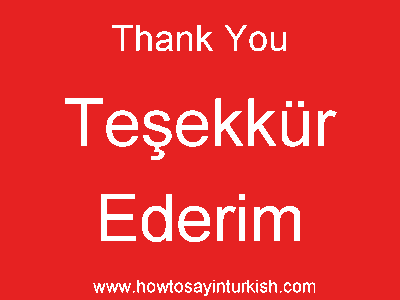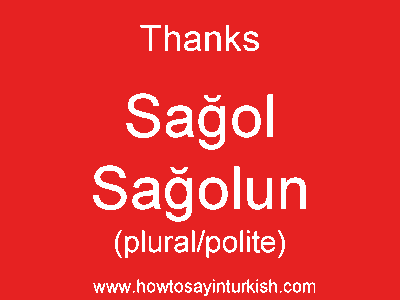Mastering Gratitude: Your Essential Guide To Saying "Thank You" In Turkish
Why Saying "Thank You" Matters in Turkish Culture
In Turkey, expressing gratitude isn't just about good manners; it's a cornerstone of social etiquette. When someone helps you, offers a kind gesture, or simply does something nice, acknowledging their effort and kindness is highly valued. It shows respect for their time and generosity, reinforcing a sense of community and mutual appreciation. By using the appropriate "thank you" phrase, you're not just uttering words; you're participating in a cultural exchange that deepens connections and leaves a positive impression. It's a way to acknowledge the time, effort, and kindness of others and fosters a sense of community and reciprocal respect.The Most Common Ways to Say "Thank You" in Turkish
Let's dive into the core phrases you'll need to express gratitude in Turkish. Practice saying these words out loud, slowly at first, until you perfect them. It's also best to learn how to write them as well.Teşekkür Ederim: The All-Rounder
The undisputed champion of Turkish gratitude, **"Teşekkür ederim"** (pronounced: *te-shek-kewr eh-de-rim*) is the most common and versatile way to say "thank you" in Turkish. * **Literal Translation:** "I thank you." * **Usage:** This phrase is incredibly flexible and can be used in almost any situation, whether formal or informal. It's your go-to for showing appreciation to strangers, colleagues, elders, or even close friends. * **Examples:** * If you're conducting a formal meeting with Turkish speakers or hosting a party, a welcoming phrase like **"Bugün geldiğiniz için teşekkür ederim"** (Thanks for coming today) should be part of your arsenal. * For a simple "Thank you for the coffee," you'd say, "Kahve için teşekkür ederim." * **For a Group:** If you're thanking someone on behalf of a group, you'll need to change "ederim" (I thank) into "ederiz" (we thank). So, you'd say **"Teşekkür ederiz."** When learning "Teşekkür ederim," try perfecting the first part, "Teşekkür," before moving on to "ederim." This helps with pronunciation and memorization.Teşekkürler: A Shorter, Sweet Alternative
Often used interchangeably with "Teşekkür ederim," **"Teşekkürler"** (pronounced: *te-shek-kewr-ler*) is a slightly shorter and quicker way to say "thanks." * **Literal Translation:** "Thanks" or "Regards." * **Usage:** While "Teşekkür ederim" is the most common and universally accepted, "Teşekkürler" is frequently used in more casual settings, much like saying "Thanks!" instead of "Thank you very much" in English. However, it's polite enough for most situations and can even be heard in formal contexts depending on the tone and speaker. * **Example:** If you've just enjoyed a wonderful time at a gathering, you might say, **"Teşekkürler, harika bir zaman geçirdik"** (Thanks, we had a great time).Sağ Ol: The Informal "Thanks"
For more casual interactions, especially with friends, family, or people you know well, **"Sağ ol"** (pronounced: *sah-ol*) is a common and warm way to express gratitude. * **Literal Translation:** "Be healthy" or "May you be healthy." * **Usage:** This phrase is strictly informal. It conveys a sense of well-wishing along with thanks. Use it with people you have a close relationship with, as it can sound too direct or even impolite in formal settings. * **Plural/Formal:** If you're addressing more than one person, or want to show a bit more respect while remaining informal, you can say **"Sağ olun"** (pronounced: *sah-oh-lun*).Eyvallah!: The Casual, Often Slangy "Thanks"
While not explicitly detailed in the data, "Eyvallah!" is listed as a Turkish word for thank you. It's an informal, somewhat slangy way of saying "thanks" or acknowledging something, often used among men. * **Usage:** Very casual, often implies "thanks, I got it" or "okay, thanks." Not suitable for formal situations.Expressing Deeper Gratitude
Sometimes, a simple "thank you" just doesn't cut it. For those moments when you want to convey profound appreciation, Turkish has an idiomatic expression that truly captures the sentiment.Ne Kadar Teşekkür Etsem Az: When Words Aren't Enough
This beautiful phrase expresses extreme gratitude, perfect for when someone has gone above and beyond. * **Literal Translation:** "However much I thank, it is little." * **Meaning:** "I can't thank you enough." or "No amount of thanks would be enough to convey my appreciation." * **Usage:** Reserve this for truly impactful situations where you feel deeply indebted or overwhelmed with gratitude.How to Respond to "Thank You" in Turkish
Just as important as knowing how to say "thank you" is knowing how to respond when someone thanks you.Rica Ederim: You're Welcome!
When someone says "thank you" to you in Turkish, the common and polite response is **"Rica ederim"** (pronounced: *ree-jah eh-de-rim*). * **Literal Translation:** "I request/beg" (idiomatically: "You're welcome," "Don't mention it," or "My pleasure"). * **Usage:** This phrase is widely used in both formal and informal settings. It's a versatile way to acknowledge the gratitude expressed by the other person and indicate that you were happy to help.Tips for Mastering Your Turkish Gratitude
* **Practice Out Loud:** The best way to get comfortable with Turkish pronunciation is to say the words out loud, slowly at first, and then gradually increasing your speed. * **Learn to Write:** Understanding how the words are written will help solidify your memory and comprehension. * **Context is Key:** Always consider the situation and your relationship with the person you're thanking. Choosing between "Teşekkür ederim," "Teşekkürler," and "Sağ ol" will demonstrate your cultural awareness. * **Regional Variations:** While standard Turkish is understood throughout the country, be aware that Turkish, as a rich language, might have some regional variations in the way "thank you" is expressed. Don't be surprised if you hear slight differences, but the phrases provided here are universally understood. * **Don't Be Afraid to Try:** Turks appreciate the effort foreigners make to speak their language. Even if your pronunciation isn't perfect, your attempt to express gratitude will be warmly received.Final Thoughts
Expressing gratitude is a universal language, but learning the specific nuances in Turkish will significantly enhance your interactions and deepen your appreciation for Turkish culture. By mastering "Teşekkür ederim," "Teşekkürler," "Sağ ol," and knowing how to respond with "Rica ederim," you'll be well-equipped to navigate social situations with grace and respect. So go ahead, practice these phrases, and start building stronger connections, one "thank you" at a time!
How do you say "Hello" and "Thank You" in Turkish? : How to say in Turkish

How to Say Thank You in Turkish: 4 Steps (with Pictures) - wikiHow

How do you say "Hello" and "Thank You" in Turkish? : How to say in Turkish